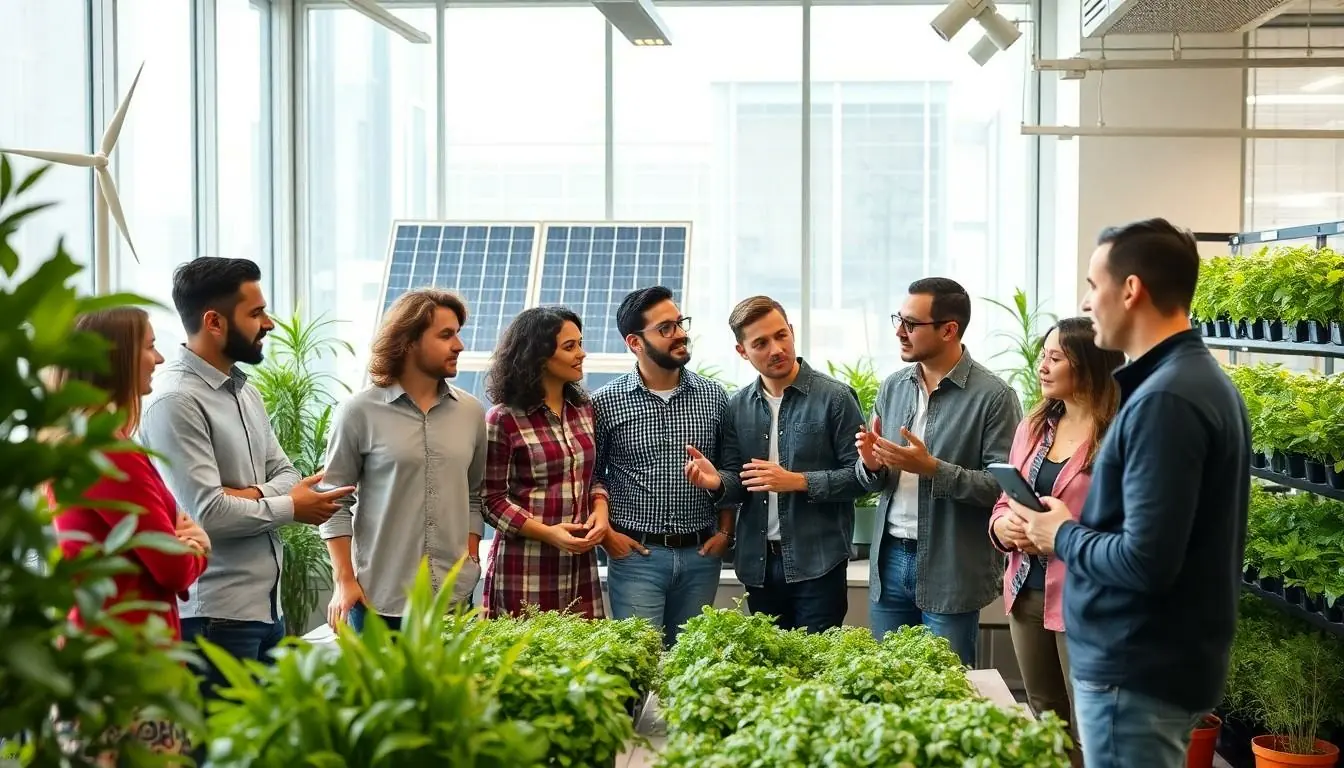Table of Contents
ToggleIn a world where plastic seems to outlive even the most stubborn of relationships, sustainability startups are swooping in like eco-friendly superheroes. These innovative ventures are not just saving the planet; they’re turning waste into wealth and making green the new black. With a dash of creativity and a sprinkle of tech-savvy, they’re tackling climate change one brilliant idea at a time.
Overview of Sustainability Startups
Sustainability startups focus on innovative solutions to combat environmental challenges. Many of these companies prioritize reducing plastic waste through creativity and technology. The startups showcase products that convert waste into valuable resources, effectively addressing climate change.
Numerous sectors benefit from the contributions of sustainability startups. Energy production, transportation, and agriculture see advancements that emphasize eco-friendly practices. For instance, clean energy startups develop renewable resources like solar and wind power. They aim to lower carbon footprints while meeting energy demands.
Additionally, some startups target sustainable packaging solutions. These companies create compostable materials and reusable containers, minimizing plastic reliance. Such innovations streamline waste management processes and promote responsible consumption.
Investors recognize the potential for profit and impact in sustainability startups. Venture capital funding for these companies increased by 40% in 2020 alone, underscoring growing interest. Entrepreneurs develop unique business models that not only drive revenue but also emphasize environmental responsibility.
Collaborations in the sector further amplify the impact of sustainability initiatives. Nonprofits partner with startups to enhance outreach and educational efforts. Communities benefit from programs that promote sustainability culture and practices.
Regulatory support strengthens commitments to sustainable solutions. Governments offer incentives for businesses that adopt eco-friendly practices. As more startups emerge with a focus on sustainability, the landscape for environmental innovation continues to evolve dynamically.
Sustainability startups represent a critical force in creating a greener future. They blend technology and sustainability, addressing urgent global issues while paving the way for economic growth.
Key Trends in Sustainability Startups

Sustainability startups focus on innovative solutions to combat environmental challenges. They address key issues such as plastic waste and climate change by employing technology and creativity.
Renewable Energy Innovations
Entrepreneurs are harnessing renewable energy sources to develop innovative solutions. Solar and wind power projects show significant promise in reducing dependency on fossil fuels. Startups work on energy storage advancements that enhance efficiency and reliability. For example, battery technology improvements enable better energy management. Between 2019 and 2021, investments in renewable energy startups rose by 40%. These innovations contribute to a sustainable energy ecosystem, promoting cleaner alternatives.
Sustainable Agriculture Practices
Sustainable agriculture practices gain traction among startups seeking to improve food systems. Companies focus on organic farming techniques that minimize chemical use and enhance biodiversity. Vertical farming and hydroponics present effective ways to maximize space and resources in urban areas. Data shows that the sustainable agriculture market is projected to reach $20 billion in 2025. By prioritizing regenerative practices, these startups contribute to soil health and reduce carbon footprints while ensuring food security.
Challenges Faced by Sustainability Startups
Sustainability startups face several challenges as they strive to make a positive impact. Two significant issues include funding obstacles and regulatory hurdles.
Funding and Investment Obstacles
Limited access to capital often impedes these startups. Many investors remain hesitant, primarily due to perceived risks associated with emerging industries. Despite venture capital funding for sustainability startups increasing by 40% in 2020, competition for resources remains fierce. Startups frequently struggle to demonstrate immediate profitability, making it hard to secure necessary investments. Financial backing might also vary according to geographical location, with some regions offering more robust support than others. Startups typically seek innovative funding solutions, such as crowdfunding and partnerships with impact investors to alleviate these challenges.
Regulatory Hurdles
Navigating regulatory environments presents another obstacle. Numerous sustainability startups encounter complex regulations that impede their operational capabilities. Compliance with environmental standards often requires significant resources. Startups may face delays in the approval process for eco-friendly products or services, hindering market entry. Inconsistent regulations across jurisdictions further complicate growth efforts. Developing relationships with regulatory bodies can improve understanding and compliance, yet this remains a time-consuming process. Startups continually adapt to changing policies while advocating for supportive frameworks that encourage sustainable practices.
Success Stories in Sustainability Startups
Sustainability startups exemplify innovative solutions in addressing environmental challenges. Notable success stories highlight impactful brands that lead the charge.
Case Study: Leading Sustainable Brands
Patagonia stands out as a pioneering brand in sustainability, emphasizing responsible sourcing and environmental activism. Their dedication to recycled materials and fair labor practices fosters consumer loyalty. Beyond apparel, Beyond Meat, a leader in plant-based protein, transforms diets while reducing greenhouse gas emissions. Their products appeal to environmentally conscious consumers promoting a shift towards sustainable food. Similarly, Tesla revolutionizes the automotive industry with electric vehicles that minimize reliance on fossil fuels. Their advancements in battery technology enhance energy efficiency, showcasing the potential for sustainable transportation. Analyzing these brands illustrates the diverse approaches to sustainability and the positive impact they create.
Impact Measurement and Growth
Measuring impact remains crucial for sustainability startups seeking to attract investors. Metrics such as carbon footprint reduction and resource conservation provide tangible evidence of progress. Companies like Interface track their carbon emissions closely, aiming for zero emissions by 2040. Financially, the sustainable agriculture market is projected to reach $20 billion by 2025, reflecting growing consumer demand for eco-friendly products. Startups also leverage technology to optimize sustainable practices, contributing to significant growth in various sectors. Investors increasingly support ventures demonstrating clear environmental and societal benefits, creating a pathway for future success.
Sustainability startups are redefining the landscape of environmental innovation. By creatively addressing plastic waste and climate change, they’re not only promoting eco-friendly practices but also driving economic growth. Their unique business models and collaborations with nonprofits pave the way for a culture of sustainability that resonates within communities.
As these startups continue to emerge, their potential to transform industries becomes increasingly clear. With rising investor interest and regulatory support, the future looks promising for those committed to sustainable solutions. The journey ahead may be challenging, but the impact of these ventures on the planet and society is undeniable. Sustainability startups are indeed the catalysts for a greener and more sustainable future.




